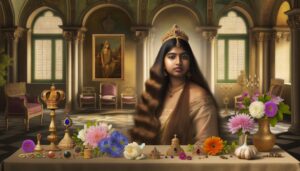Meaning of the Name Irie
The name 'Irie,' derived from Jamaican Patois, signifies a profound sense of peace, well-being, and harmony. Rooted in the Rastafarian vocabulary, 'Irie' is an adjective reflecting a balanced and serene state of existence.
Its cultural significance extends beyond language, encapsulating Rastafarian philosophy, emotional well-being, and social connection. The term is integral to reggae music, enhancing the genre's themes of joy and resilience.
Modern usage has seen 'Irie' embraced globally, symbolizing an ideal state of existence. This multifaceted term continues to gain popularity, especially among contemporary parents and the wellness industry.
Delving further reveals intriguing aspects of its broader cultural impact.

Key Takeaways
- 'Irie' is a Jamaican Patois term meaning peacefulness and well-being.
- It originates from Rastafarian vocabulary, symbolizing balance and serenity.
- 'Irie' emphasizes emotional well-being and spiritual harmony in Jamaican culture.
- The term is popular in reggae music, reflecting joy and positivity.
- 'Irie' is used globally to represent peace and positive well-being.
Jamaican Patois Origins
The term 'Irie' finds its origins in Jamaican Patois, a Creole language that arose from the fusion of English and various African languages during the colonial period.
Jamaican Patois developed as a means of communication among enslaved Africans who were brought to Jamaica and had to adjust to a new linguistic environment.
This hybrid language reflects a diverse tapestry of cultural and historical influences, blending elements of syntax, vocabulary, and phonetic patterns from its constituent languages.
The emergence of Patois was a form of resistance and resilience, enabling enslaved peoples to preserve aspects of their native linguistic heritage while maneuvering through the oppressive colonial system.
Therefore, 'Irie' is embedded within a broader context of cultural synthesis and historical significance.
Linguistic Meaning
Rooted in the rich tapestry of Jamaican Patois, the term 'Irie' linguistically conveys a state of peacefulness, positivity, and overall well-being.
The word is derived from the Rastafarian vocabulary and has permeated everyday language, encapsulating an essence of contentment and harmony.
Semantically, 'Irie' functions as an adjective, often used to describe a situation, mood, or environment that is exceptionally good or pleasing.
Its phonetic simplicity belies a complex interplay of cultural and emotional resonance, making it a versatile term within the linguistic framework.
The use of 'Irie' signifies more than mere happiness; it embodies a holistic sense of balance and serenity, reflecting the ethos of its Patois origins.
Cultural Significance
Often imbued with deep cultural resonance, 'Irie' transcends its linguistic origins to encapsulate the spirit and values of Jamaican society. Its significance extends beyond the literal translation of 'good' or 'alright,' reflecting a holistic sense of well-being and harmony.
This term is a cornerstone in Jamaican Patois, embodying the essence of Rastafarian philosophy and communal ethos. The cultural weight of 'Irie' is evident in several ways:
- Emotional Well-being: It emphasizes mental and emotional peace.
- Social Connection: It fosters a sense of community and belonging.
- Spiritual Harmony: It aligns with the Rastafarian pursuit of spiritual balance.
- Positive Outlook: It encourages an optimistic and resilient mindset.
Each facet contributes to the term's enduring cultural significance.
Irie in Music
The concept of 'Irie' has been profoundly shaped by the reggae genre, where it encapsulates a state of peacefulness and positivity that is central to the music's ethos.
Numerous reggae songs, such as those by Bob Marley and Toots and the Maytals, prominently feature the term, embedding it within the cultural lexicon.
Additionally, contemporary artists across genres continue to embrace 'Irie,' further solidifying its relevance in musical expressions of tranquility and well-being.
Reggae Influence on Irie
In reggae music, the term 'irie' frequently conveys a sense of profound well-being and positive vibration, reflecting the genre's cultural and emotional ethos. This term is deeply embedded in the lyrical and thematic fabric of reggae, symbolizing the following core elements:
- Harmony: It underscores the importance of inner peace and unity.
- Positivity: 'Irie' embodies a joyful state of mind, essential to reggae's uplifting messages.
- Cultural Identity: It reflects the Jamaican roots and the Rastafarian influence within the music.
- Resilience: The term is often used to convey strength and perseverance amidst adversity.
These elements collectively highlight how 'irie' serves as a cornerstone, shaping the distinctive character and impact of reggae music.
Popular Irie Songs
Numerous iconic reggae tracks prominently feature the term 'irie,' showcasing its integral role in conveying themes of joy, peace, and resilience. Bob Marley's 'Positive Vibration' and Steel Pulse's 'Your House' both exemplify the use of 'irie' to evoke a sense of well-being and harmony.
The word's presence in these songs does more than add a cultural touch; it encapsulates the essence of reggae's message. Additionally, tracks like 'Irie' by Mikey Dread and 'Feelin' Irie' by Barrington Levy further emphasize its significance in the reggae lexicon.
The consistent use of 'irie' in these songs not only underscores its linguistic importance but also its capacity to unify listeners under a banner of positivity and strength.
Artists Embracing Irie
Building on the rich tradition of reggae, numerous artists across various genres have embraced the term 'irie' to infuse their music with themes of positivity and resilience. This integration not only pays homage to reggae roots but also broadens the term's cultural resonance.
Notable examples include:
- Bob Marley: Popularized 'irie' in global consciousness through songs like 'Three Little Birds.'
- Ziggy Marley: Continuously promotes irie vibes in his music, emphasizing peace and love.
- Sublime: American ska punk band that incorporates 'irie' to convey laid-back, positive energy.
- Nas & Damian Marley: Their collaborative album 'Distant Relatives' uses 'irie' to bridge hip-hop and reggae, highlighting social unity.
These artists demonstrate how 'irie' transcends musical boundaries, enriching various genres with its uplifting essence.
Modern Usage
The modern usage of the name Irie extends beyond its Jamaican roots, symbolizing a state of peace, harmony, and positive well-being in various cultural contexts.
In contemporary society, Irie has transcended its origins to become a term embraced globally, often used in lifestyle branding, wellness industries, and by individuals seeking to convey a sense of tranquility and balance.
This evolution reflects a broader, cross-cultural appreciation for the values of inner peace and holistic health. In linguistic terms, Irie has maintained its phonetic simplicity while gaining semantic depth, representing an ideal state of existence.
This adaptability highlights the term's capacity to resonate with diverse audiences, emphasizing a universal aspiration toward a serene and harmonious life.
Popularity of the Name
In recent years, the name Irie has seen a notable rise in popularity, reflecting a growing appreciation for its positive connotations and cultural heritage. This trend can be attributed to several factors, including:
- Cultural Resonance: Irie's roots in Jamaican Patois resonate with a global audience seeking names with rich cultural significance.
- Positive Meaning: The name embodies a sense of peace and well-being, qualities that have universal appeal.
- Unique Sound: Its unique phonetic structure sets it apart from more traditional names, making it attractive to modern parents.
- Celebrity Influence: Public figures and media portrayals have also contributed to its rising popularity.
These factors collectively highlight why Irie is becoming an increasingly favored choice for naming children.
Irie in Media
The name Irie has permeated various facets of media, appearing in popular song titles that often evoke themes of peace and positivity.
Film and television references further cement its cultural resonance, frequently used to underscore characters or settings imbued with a sense of well-being.
Additionally, Irie makes notable appearances in literature, where its nuanced meaning can enhance narrative depth and character development.
Popular Song Titles
Numerous popular song titles incorporate the word 'Irie,' reflecting its cultural resonance and widespread appeal in music. This term, rooted in Jamaican Patois, symbolizes an ideal state of well-being and positivity, making it a compelling choice for lyrical themes.
Notable examples include:
- 'Irie' by Logic – A track that embraces a carefree, positive outlook.
- 'I'm So Irie' by Peter Tosh – A reggae classic celebrating the essence of irie.
- 'Feelin' Irie' by Ziggy Marley – A song that captures the joy and peaceful vibes associated with the term.
- 'Irie' by Rebelution – An anthem of happiness and living in harmony.
These songs exemplify how 'Irie' transcends linguistic boundaries, resonating deeply with diverse audiences.
Film and TV References
Film and television have also embraced the term 'Irie,' embedding it within narratives to evoke themes of tranquility, happiness, and cultural richness. In various media, 'Irie' often symbolizes a state of well-being and a connection to Jamaican culture.
For instance, the term appears in dialogue or character names to highlight a sense of peace and positivity. Shows like 'Cool Runnings,' though not explicitly using the term, encapsulate the 'Irie' spirit by celebrating Jamaican resilience and joy. Additionally, in series featuring Caribbean settings, such as 'Death in Paradise,' the term subtly underscores the idyllic and harmonious aspects of island life.
The usage of 'Irie' in these contexts enriches the narrative, offering viewers a glimpse into the cultural ethos it represents.
Literary Appearances
'Irie' has found its place in literature, where it is often employed to evoke a sense of peace, cultural identity, and emotional well-being within the narrative. Authors use the name to encapsulate a character's journey or setting imbued with tranquility and positive cultural connotations.
Notable literary works have used 'Irie' to highlight:
- Character Development: The growth of a character towards embracing inner peace.
- Cultural Significance: Reflecting the Afro-Caribbean heritage and values.
- Thematic Depth: Enhancing themes of harmony, resilience, and emotional balance.
- Symbolic Representation: Acting as a symbol for serenity and well-being.
Through these applications, 'Irie' enriches the narrative, offering readers a deeper understanding of the characters' emotional and cultural landscapes.
Symbol of Positivity
Embracing the term 'Irie' often signifies a state of peaceful contentment and positive well-being. It encapsulates not just a word but a cultural ethos that resonates deeply within Jamaican and Rastafarian cultures. The expression embodies a holistic sense of harmony and satisfaction.
| Aspect | Description |
|---|---|
| Origin | Rooted in Jamaican Patois |
| Cultural Impact | Strong influence in music and lifestyle |
| Emotional Tone | Conveys tranquility and happiness |
| Symbolism | Represents positivity and inner peace |
The term 'Irie' is more than a casual greeting; it is a declaration of one's inner state. It encourages a serene mindset, promoting mental and emotional well-being. By understanding its implications, one can appreciate its profound contribution to cultural and personal positivity.
Conclusion
To sum up, the name 'Irie' encapsulates a rich tapestry of Jamaican Patois origins, profound linguistic meaning, and significant cultural resonance.
Its presence in music and media underscores its enduring appeal and symbolic positivity. Modern usage and growing popularity reflect its adaptable nature.
How does a single word manage to convey such depth and positivity?
The name 'Irie' serves as a powerful emblem of tranquility and well-being, demonstrating the profound impact of language on cultural identity.






